Editor’s Note: This post first appeared on Jeet Heer’s blog Sans Everything. Jeet graciously suggested we reprint it here as coda to our hatefest, just as a reminder that everything should be hated, not just comics.
_________________
Shaw:No Lover of Shakespeare He
Over at Crooked Timber, they are having a lively discussion provoked by George Bernard Shaw’s scorn for Shakespeare. On many occasions Shaw expressed extreme distain for the Bard of Avon. In a 1906 letter Shaw wrote “I have striven hard to open English eyes to the emptiness of Shakespeare’s philosophy, to the superficiality and second-handedness of his morality, to his weakness and incoherence as a thinker, to his snobbery, his vulgar prejudices, his ignorance, his disqualifications of all sorts for the philosophic eminence claimed for him.”
Shaw’s opinions are easy to dismiss, but it is often forgotten that there is a long and venerable tradition of Shakespeare-hatred, a critical tradition that includes not just crank and reflexive contrarians but also some very great writers. Aside from Shaw, Voltaire and Leo Tolstoy were also vociferously hostile to Stratford’s favourite son. Voltaire actually started off as a champion of Shakespeare but turned against the English writer’s plays. More recently the novelist Joyce Carol Oates (in her collection Contraries) and mad-dog essayist Marvin Mudrick have taken aim at Shakespeare.
Below I’ve assembled a mini-anthology of Shakespeare-bashing. Although I myself am rather fond of Shakespeare, I have to say I think this tradition of attacking the dramatist is actually quite valuable. Unlike most of the thousands of volumes given over to bardolatry, the anti-Shakespeare brigade doesn’t assume that every jot and titter that flowed out of the playwright’s quill pen is pure gold. The hostile critics tend to be close readers, alert to the texture of the words and the logic of the plots. They pay Shakespeare the respect of careful scrutiny. The opponents of Shakespeare treat him as a living writer, one whose choices can be argued with, not as a marble statue commemorating universal and immemorial truths. Tolstoy in particular was a very astute critic and his long essay (or short book) on Shakespeare deserves more attention than it’s received.
So here is an anthology of Shakespeare-hatred.
Tolstoy:
I remember the astonishment I felt when I first read Shakespeare. I expected to receive a powerful esthetic pleasure, but having read, one after the other, works regarded as his best: “King Lear,” “Romeo and Juliet,” “Hamlet” and “Macbeth,” not only did I feel no delight, but I felt an irresistible repulsion and tedium, and doubted as to whether I was senseless in feeling works regarded as the summit of perfection by the whole of the civilized world to be trivial and positively bad, or whether the significance which this civilized world attributes to the works of Shakespeare was itself senseless. My consternation was increased by the fact that I always keenly felt the beauties of poetry in every form; then why should artistic works recognized by the whole world as those of a genius,—the works of Shakespeare,—not only fail to please me, but be disagreeable to me? For a long time I could not believe in myself, and during fifty years, in order to test myself, I several times recommenced reading Shakespeare in every possible form, in Russian, in English, in German and in Schlegel’s translation, as I was advised. Several times I read the dramas and the comedies and historical plays, and I invariably underwent the same feelings: repulsion, weariness, and bewilderment. At the present time, before writing this preface, being desirous once more to test myself, I have, as an old man of seventy-five, again read the whole of Shakespeare, including the historical plays, the “Henrys,” “Troilus and Cressida,” the “Tempest,” “Cymbeline,” and I have felt, with even greater force, the same feelings,—this time, however, not of bewilderment, but of firm, indubitable conviction that the unquestionable glory of a great genius which Shakespeare enjoys, and which compels writers of our time to imitate him and readers and spectators to discover in him non-existent merits,—thereby distorting their esthetic and ethical understanding,—is a great evil, as is every untruth.
George Bernard Shaw:
Search [in Shakespeare] for statesmanship, or even citizenship, or any sense of the commonwealth, material or spiritual, and you will not find the making of a decent vestryman or curate in the whole horde. As to faith, hope, courage, conviction, or any of the true heroic qualities, you find nothing but death made sensational, despair made stage-sublime, sex made romantic, and barrenness covered up by sentimentality and the mechanical lilt of blank verse.
All that you miss in Shakespeare you find in Bunyan, to whom the true heroic came quite obviously and naturally. The world was to him a more terrible place than it was to Shakespeare; but he saw through it a path at the end of which a man might look not only forward to the Celestial City, but back on his life and say: ‘Tho’ with great difficulty I am got hither, yet now I do not repent me of all the trouble I have been at to arrive where I am. My sword I give to him that shall succeed me in my pilgrimage, and my courage and skill to him that can get them.’ The heart vibrates like a bell to such utterances as this; to turn from it to ‘Out, out, brief candle,’ and ‘The rest is silence,’ and ‘We are such stuff as dreams are made on, and our little life is rounded by a sleep’ is to turn from life, strength, resolution, morning air and eternal youth, to the terrors of a drunken nightmare.
Marvin Mudrick: Known as the Dirty Harry of Literary Criticism
Marvin Mudrick’s Nobody Here But Us Chickens – arguably the most eccentric book of literary criticism ever written by a sane writer – is long out of print. So I’ve scanned in one chapter (“The Unstrung Zero”) dealing with Hamlet. Mudrick write about Shakespeare elsewhere in the book, sometime appreciatively, but here he is at his most tart. (The rest of the book, with discussions of everyone from Lady Murasaki to Leon Trotsky, is very much worth reading).

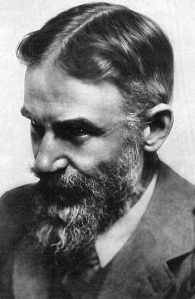
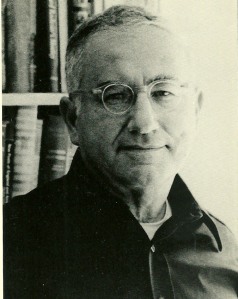

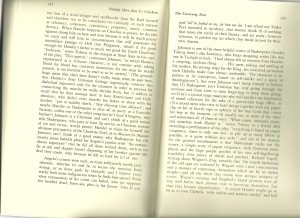
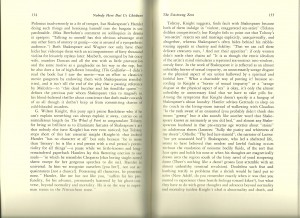
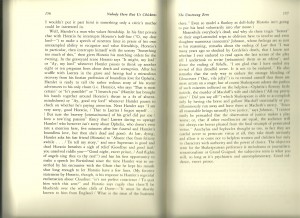
It’s pretty fun that the basic argument against Shakespeare by both Shaw and Mudrick is that he’s insufficiently moral. Mudrick even seems to be arguing that showing innocents killed is in itself evil, and that true art only shows those suffering who deserve it (as near as I can tell, by his logic, the Book of Job is melodramatic trash.)
Shakespeare really is exploitation genre fare in a lot of ways. That doesn’t make me like it less (on the contrary) but you could see where it might cause cognitive dissonance for some when they suddenly realize…hey! Wait a minute! This is pulp!
Mudrick seems to get better jabs in against Shakesphere’s critical supporters than against Shakesphere, but maybe I only think that way because “this artist is a weirdo” is a plus in my book.
Tolstoy’s objections were largely moralistic as well….or at least Orwell thought so:
“[Tolstoy’s] main aim, in his later years, was to narrow the range of human consciousness. One’s interests, one’s points of attachment to the physical world and the day-to-day struggle, must be as few and not as many as possible. Literature must consist of parables, stripped of detail and almost independent of language…Clearly he could have no patience with a chaotic, detailed, discursive writer like Shakespeare. His reaction is that of an irritable old man who is being pestered by a noisy child. ‘Why do you keep jumping up and down like that? Why can’t you sit still like I do?'”
I find it impossible, in this connection, not to think of Shaw and Chesterton when I read of “an irritable old man who is being pestered by a noisy child.”
Chesterton would love that comparison, certainly.
I wonder if anyone has gone after the sonnets? You can’t accuse them of being pulp like the plays, I wouldn’t think….
I have to say I find the sentiments animating the early Sonnets to be quite absurd: the poet is telling his lover that he should have children so the poet can look on younger versions of the lover. Who thinks like that?!?
I do think part of Shaw’s dislike of Shakespeare was because Shakespeare was a monarchist who is always casting his rebels as the villains.
“I have to say I find the sentiments animating the early Sonnets to be quite absurd: the poet is telling his lover that he should have children so the poet can look on younger versions of the lover. Who thinks like that?!?”
I don’t think that’s especially crazy. One of the (many) joys of children is seeing your loved one in them, I think.
If you think that’s overly mannered, though, you should try reading Swinburne. Poem after poem about suicide as transcendent love….
I feel like Ben Jonson, the first hater of Shakespeare as literary icon (Robert Greene hates Shakespeare the upstart first, of course), deserves mention:
“I remember, the players have often mentioned it as an honour to Shakespeare that in his writing (whatsoever he penned) he never blotted out line. My answer hath been, would he had blotted a thousand.”
Jonson also complained of Shakespeare’s little Latin & less Greek. Although in this case, I think this just goes to show that mastery of your mother tongue is more important than skill in foreign languages. Jonson was incomparable better versed in Latin & Greek than Shakespeare but that didn’t make BJ a better English poet at all. It reminds me a little of how George Eliot & her partner looked down upon Dickens for his lack of education.
I do like Middlemarch more than anything by Dickens, I have to say. Though the other Eliot I’ve tried to read (like Silas Marner) is pretty dreadful.
Jonson’s pretty fantastic. Not as good as Shakespeare, I’ll agree, but that’s a pretty high bar.
My problem is that I actually like the Shakespeare stuff which I’m supposed to hate – as in Titus Andronicus. That’s definitely amoral, “pulp-ish”, and exploitative (to paraphrase Noah).
Suat, I don’t think there’s any Shakespeare you’re supposed to hate. Even Titus Andronicus is thoroughly critically validated. Like it in peace!
In my experience, everybody loves Titus Andronicus (well, except Ben Jonson). Pulpy, yes, but that rare kind of pulp that turns on its characters’ detailed knowledge of Ovid’s account of Tereus and Philomel.
And the odd thing about “small Latin and less Greek” is that it’s a part of a long celebratory poem in the First Folio.
The early sonnets are definitely weaker than the later ones…And isn’t it the really early histories that people feel content to piss upon a little. Can’t recall anything nice ever said about Henry VI, parts 1-3 (yes, three parts!)…Even Richard II, I think, kind of falls into that category. And what about 2 Noble Kinsmen? I do think some of the more rarely performed plays are rarely performed for a reason.
Troilus and Cressida is also not very good (actually read that one). Chaucer’s version is way better.
That said, these “moral” criticisms are pretty silly. I like Shaw ok and I’m a fan of Tolstoy insofar as I’ve read him (never did read War and Peace…but Anna Karenina is great)…but their criticism just strikes me as a) jealousy and b) petty quibbling.
Ol’ Bill wasn’t always at his best, but when he was, he’s pretty hard to beat.
It’d definitely not petty quibbling; they’re both adamantly ideologically opposed to what he’s doing. It’s a central argument, not a marginal one.
As for jealousy…I don’t know. Anyone who criticizes anyone of anything is accused of jealousy, it seems like. Shaw certainly felt competitive with Shakespeare, I think — and he also if I remember right gave him his due in terms of his amazing facility for language. But Shaw also thought that literature was constantly progressing, and that contemporary writers were automatically better than older ones since they had more knowledge. Which is a really stupid thing to think, but suggests that his problem re Shakespeare was not necessarily too much insecurity.
The idea that literature is perpetually getting better is pretty dumb.
But in the 17th century, there might only have been 7 or 8 known shades of grey about which to write…
It’s incredibly dumb. It’s part of Shaw’s knee-jerk progressivism…which also led him, more depressingly, to support Stalin, and even walk up to specifically justifying the purges (though I’d bet if he’d let himself know what was really happening, he would have been appalled.)
Nonetheless, Shaw is one of my absolute favorite writers. Not sure I like him better than Shakespeare, but it’s close.
—————————
Jeet Heer says:
Unlike most of the thousands of volumes given over to bardolatry, the anti-Shakespeare brigade doesn’t assume that every jot and titter that flowed out of the playwright’s quill pen is pure gold.
————————–
Their fatal flaw is in therefore assuming that, then, nothing is. (For a balanced “warts and all”-type critical approach, might I recommend Daniel Hoffman’s “Poe Poe Poe Poe Poe Poe Poe”…)
————————–
Noah Berlatsky says:
…Mudrick even seems to be arguing that showing innocents killed is in itself evil, and that true art only shows those suffering who deserve it (as near as I can tell, by his logic, the Book of Job is melodramatic trash.)
—————————
Indeed so! In “Nobody Here But Us Chickens” (thanks for the scans, Jeet!) it is approvingly noted how…
—————————
Aeschylus and Sophocles…are careful never to persecute virtue at all, they take death seriously and allow it to come not to helpless women and children but only to characters with authority and the power of choice.
—————————-
Thus, that Shakespeare does not depict violence and death as being so proper and circumspect means that…
——————————
The objective term for the Shakespearean preference is melodrama or journalistic sensationalism or Grand Guignol…
——————————-
If helpless or righteous people are shown suffering, then you’re a pandering sensationalist. Yes, truly “objective”…!
Why, that “showing innocents killed is in itself evil” argument reminds of the reaction of those who argue that Alan Moore’s showing women raped, or almost raped, or “it is possible that they could have been raped, so let’s assume the worst” is itself “misogynistic.”
(Never mind that Moore shows the act as brutal, ugly, vile; clearly reprehensible and not at all erotic; unlike that slimeball Manara, who exploitatively shows rape as titillating, the victims prettily oohing and aahing.
——————————-
Jeet Heer says:
I have to say I find the sentiments animating the early Sonnets to be quite absurd: the poet is telling his lover that he should have children so the poet can look on younger versions of the lover. Who thinks like that?!?
———————————
Put that way, it sounds absurd; but consider the original:
———————————
From fairest creatures we desire increase,
That thereby beauty’s rose might never die,
But as the riper should by time decease,
His tender heir might bear his memory…
———————————
Moving, beautiful, and understandable. If a parent mourns the untimely death of a grown-up child, is not seeing their features in the surviving grandchild a comfort? Or, a grieving marriage-partner seeing the likeness of a dead spouse in their child?
Showing that they are not utterly gone, but something of them yet lives?
(Damn, I’m actually getting teary-eyed; Shakespeare strikes again!)
Lo, these many years ago, a line from a Shakespeare character she’d played (Viola, in “Twelfth Night”) was quoted at the end of an interview to Diana Rigg by a “TV Guide” reporter:
Lady, you are the cruell’st she alive
If you will lead these graces to the grave,
And leave the world no copy.
Rigg laughed; “There is still time.”
…Indeed, she eventually did have a daughter:
http://i2.cdnds.net/12/27/618×448/uktv_diana_rigg_rachael_stirling.jpg
http://www.radiotimes.com/news/2012-07-02/doctor-who—diana-rigg-and-rachael-stirling-to-star-in-mark-gatiss-penned-episode